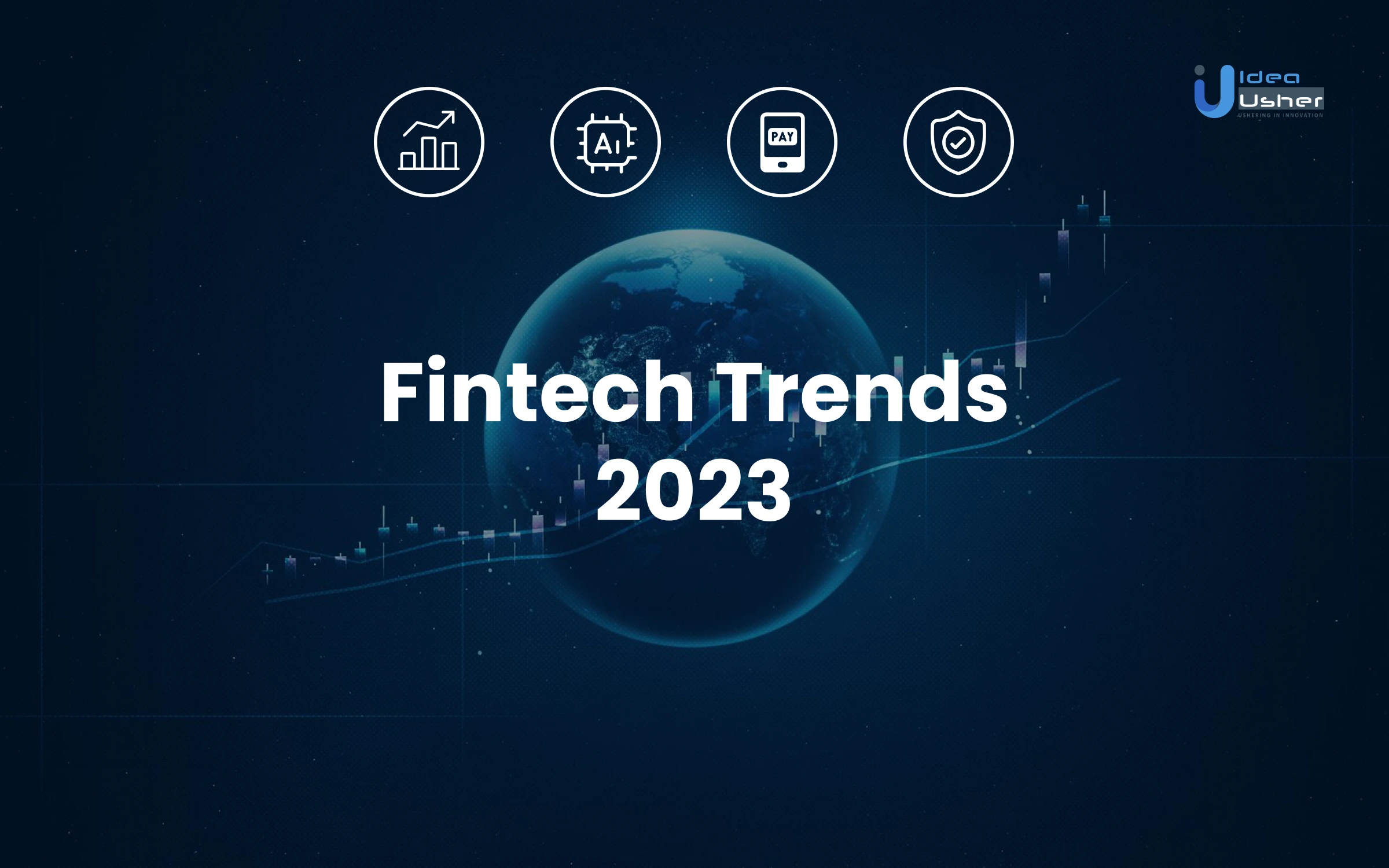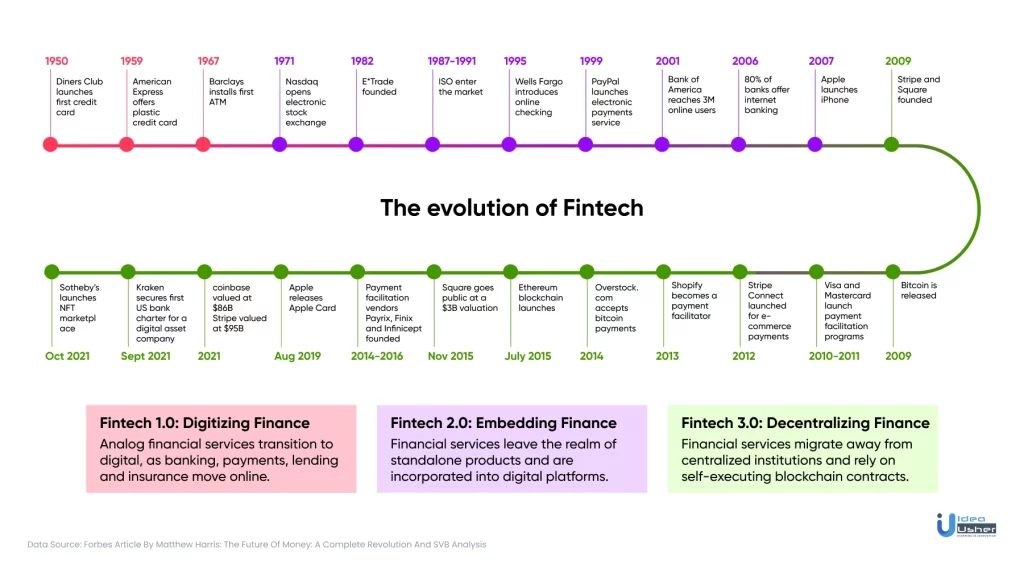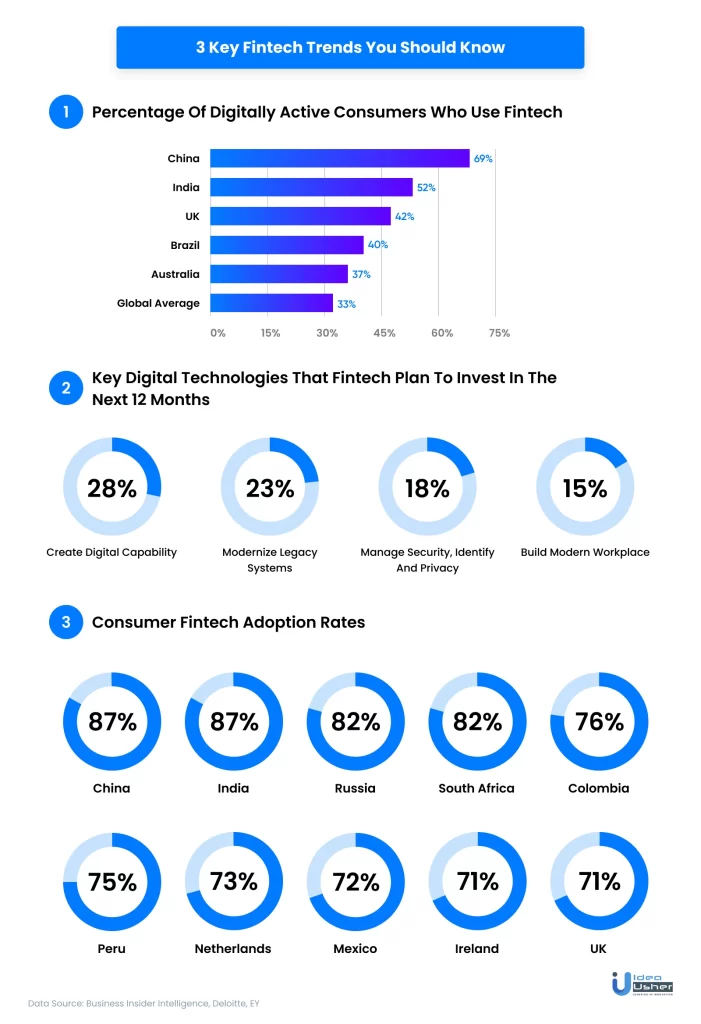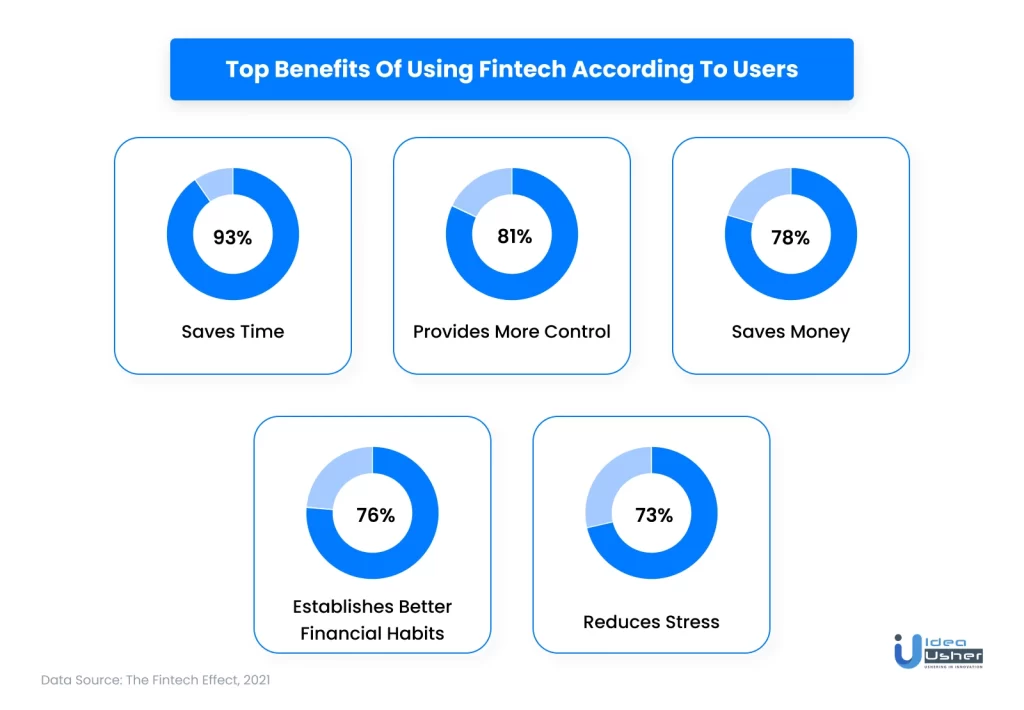- 1. RegTech
- 2. Digital-only bank
- 3. DeFi and Blockchain
- 4. Artificial Intelligence
- 5. Smart contract
- 6. Contact-less payments
- 7. Alternative finance
- 8. Embedded finance
- 9. Buy now, pay later
- 10. Banking-as-a-Service
- 11. BaaE (Banking as an Experience)
- Lead the future with fintech trends, and get your app developed by Idea Usher.
- FAQ

According to the prediction in 2022, digital payments will total $8.49 trillion globally in 2027, when it increases at a 12.31% CAGR. Furthermore, by 2027, the fintech industry is anticipated to reach $400 billion. This data shows that the fintech sector is evolving with a promised innovation that will meet customers’ demands and create ample business opportunities. Let’s look at the key fintech trends for the year and how they will influence global enterprises and consumer experiences.

Here is the list of trends to watch in 2023 in fintech:
- 1. RegTech
- 2. Digital-only bank
- 3. DeFi and Blockchain
- 4. Artificial Intelligence
- 5. Smart contract
- 6. Contact-less payments
- 7. Alternative finance
- 8. Embedded finance
- 9. Buy now, pay later
- 10. Banking-as-a-Service
- 11. BaaE (Banking as an Experience)
- Lead the future with fintech trends, and get your app developed by Idea Usher.
- FAQ
1. RegTech
The RegTech industry will experience 200% growth between 2022 and 2026
Juniper Research predicts
RegTech has lately come to be regarded as a pillar of the FinTech industry. What is RegTech precisely, and why is it significant?
Among all industries in the world, the financial industry is one with the most regulations. RegTech is anticipated to transform the regulatory environment this year by offering cutting-edge technological solutions to compliance-related problems. As the name suggests, regulatory technology is a subset of FinTech that uses technology to monitor regulatory processes.
Businesses in the regtech sector usually deal with tracking, reporting, and compliance-related concerns. Although the word first debuted in 2008, the sector has lately seen great development. This growth is projected to continue as alternative finance, blockchain, and AI become increasingly involved.
The development of regtech has made it possible for companies to automate almost all steps in the compliance process. RegTech will advance its solutions to help financial institutions identify and mitigate risks in the upcoming years with the use of cloud technology, machine learning, and big data analytics.
By 2030, it is predicted that the RegTech industry will reach a startling $44 billion. In contrast, its value in 2021 was only $8.2 billion.
Custom Market Insights
2. Digital-only bank
Digital-only banks are mostly to blame for the 36% decline in branch visits from 2017 to 2022. They provide convenience banking. It facilitates online P2P transfers, contactless MasterCard with no transaction costs, the ability to purchase and sell Ethereum, Bitcoin, and other cryptocurrencies, along with the ability to make international payments.
Some of the digital-only banks competing for customer space (money and membership) is Revolut. Along with many others, it is joined by FirstDirect, HelloBank, Monese, Moven, and Digibank.
Digital-only banks are growing in numbers and generating huge revenue globally while offering facilities like:
- No need to visit physical banks
- Zero waiting time in queues
- No manual paperwork
- Change of pin and information updation online
- Snap-a-pic bill payment
- Expense management tools
- Instant balance review features
- Real-time analytics
3. DeFi and Blockchain
The first thing to keep in mind is that DeFi promptly and for free addresses peer-to-peer transactions. According to recent research, more people are beginning to recognize the benefits of cryptocurrencies for overseas payments. In October, Google and well-known cryptocurrency startup Coinbase announced a new alliance. Google would start accepting bitcoin payments in addition to providing resources and infrastructure. Decentralized Finance seems to be a big part of the FinTech market in 2023.
Similarly, blockchain is revolutionizing how money is transferred internationally. It is quicker, more accessible globally, and has inexpensive processing costs. Over the next ten years, blockchain may increase the global economy to $1.76 trillion, with China ($440 billion) and the US ($407 billion) earning the most from the technology. (PwC, 2020).
With a 29.7% market share, the banking sector has the greatest global distribution of blockchain market value. Another PwC report predicts that 2025 will be the turning point in the widespread use of blockchain technology across all major economies.
4. Artificial Intelligence
86% of financial services AI adopters say that adopting this technology will be critical to their business’s success in the next two years.
According to a recent Deloitte survey of IT and line-of-business executives.
Artificial intelligence (AI) enables the automation of complex and high-value processes. Furthermore, AI is a proven technological advancement that hugely impacts the financial industry and banking sectors.
AI technology will cut bank operational expenses by 22% around 2020, which might result in savings of up to $1 trillion.
AI assists with the following in the financial industry:
- Chatbot interactions
- Personalized customer service
- Faster transactions
- Drives infrastructure decisions
- Aid in fighting fraud, cybercrime, and money laundering.
AI algorithms in financial applications will help determine how and who gets access to various financial services ano what extent. In 2023, AI will be increasingly used in the fintech sector to help with loan choices, deal-making, and fraud detection.
Some popular AI-based customer service software
| Zendesk | This software provides a solution for gaining and retaining customers’ trust and loyalty to your brand. |
| Vision Helpdesk | It offers essential customer service functionalities like chat, calls, web forms, social media integration, etc. |
| Freshservice | It offers a CMDB, ticketing system, and accessible knowledge base to help you with customer service for your clients. |
| LiveAgent | It provides live chat, email support, and social media integration to gain and retain customers. |
| Freshdesk | It’s customer service software for all or any size and type of organization. It offers support and advanced features for customers and businesses. |
5. Smart contract
Smart contracts digitalize trust to make transactions secure and enforceable anywhere. It accomplishes it without referring to the complex technical, legal, or philosophical foundations of contracts.
In smart contracts, parties submit cryptographic keys as digital signatures. The contracts are stored electronically rather than on paper, and the codes are practically resilient to manipulation and are promised to operate precisely and predictably.
Multiple computing devices that each get the same copy of the initial digital contract serve as the analog of a smart contract for witnesses. Because of this, it is essentially impossible to violate the contract’s legitimacy. Not only that, but these systems—which today make up what is known as a public blockchain—would oversee the contract’s execution until all of its conditions are met. This expedites financial transactions even more from virtually any location and at any time.
6. Contact-less payments
Contactless payments have been a part of FinTech for a while, but they took off after the Corona epidemic. According to a survey, from 2020 to 2021, there was an 11% increase in the number of contactless, cashless transactions. Additionally, it appears that the pattern will stay the same.
Research from 2021 predicts that the number of these transactions will rise by 92% worldwide in 2023. Contactless payments have become more common as a quarantine security measure. Nevertheless, consumers are increasingly aware of how quickly, easily, and conveniently they make purchases. They, therefore, represent FinTech trends that will continue to develop in 2023.

7. Alternative finance
The term “alternative finance” refers to corporate financing provided by organizations other than banks, such as revenue-based financing (RBF). Another alternative financing option is invoice factoring, which allows businesses to sell their unpaid invoices for fast cash at a discount.
Although these ideas are not new, in 2023, it is anticipated that they will completely embrace digital technology and see tremendous growth. It is anticipated that sectors including freelancers, MSMEs, the underbanked, and the unbanked would benefit from the growth of targeted banking products that are specifically aimed at such sectors.
In fact, according to Gartner, by 2027, 60% of larger banks would finance underserved small firms through unconventional underwriting.
There are several causes for this, including:
- There is still a funding deficit from COVID-19.
- The desire for global financial inclusion.
- The rise of e-commerce companies, which have a high-risk profile for traditional bank loans.
Numerous studies predict that the size of the worldwide alternative finance industry, which is currently valued at USD 6.62 billion, will increase by 6.3% between 2022 and 2028.
8. Embedded finance
I think the easiest way to think about embedded finance is how you take non-financial or non-traditional financial products, and you infuse financial services through them.
Sofiat Abdulrazaaq, CEO and co-founder of Goodfynd
Embedded finance has a massive ecosystem; this year, it is anticipated to expand dramatically. The embedded payment sector is likely to expand by 40.4% yearly, according to researchers.
Businesses may boost customer experience and income by providing comprehensive offers throughout a client’s journey with embedded finance. It includes financial services, including banking, credit, investing, processing payments, lending, and insurance.
Buy now pay later (BNPL) is a field of embedded finance that is rapidly expanding across the board. With this method of payment, customers can place an order today and pay for their purchases later, typically in a series of payments.
9. Buy now, pay later
Often under criticism by some finance experts, as it tends to promote consumer culture in an unhealthy way, the Buy Now Pay Later (BNPL) is an emerging trend. It’s the assumption that BNPL might lead people into financial strife and debt. However, this model is gaining popularity across Europe, the US, and the eCommerce sector.
Existing applications implement the BNPL model with the help of new POS integration paired with online checkout features. It is turning out to be an important aspect of sales and marketing psychology for many retailers.
10. Banking-as-a-Service
In 2023, open banking usage will reach previously unseen levels among new fintech trends. It’s because customers rely heavily on technology in many facets of their financial lives. Financial institutions will thus be responsible to meet this need and provide a wide range of BaaS solutions in line with the most recent technological developments.
Banks will need to create open API platforms to offer specific banking goods and services to fintectoto participate in the open banking and BaaS ecosystem. Banks might offer more capable Developer Portals with API documentation and sandbox testing environments to fintech themselves. They may rapidly integrate the desired financial services with this assistance. Virtual accounts as a service, POS financing, and other possibilities are some of the prospects that BaaS offers.
11. BaaE (Banking as an Experience)
Banking and financial services are evolving into a customer-focused sector. It is the prediction that BaaE will be one of the key differentiators. Future financial products will incorporate a new level of interaction together with convenience and security.
Financial institutes will likely improve service quality and develop analytics to become preferred financial partners. Customer retention will increase over time, which can turn out to be a benefit for all stakeholders in the financial sector’s customer-centric strategy.
However, the mere provision of financial services via digital channels won’t be sufficient in 2023. The next level of UX/UI for the financial industry is thus a major issue for the coming year. This translates to more user-friendly, accessible, and intuitive digital solutions that give customers great banking experiences. This is why, in order to enable a flawless onboarding and payment experience, UX will be even more important. The end effect can be better ROI and client retention.

Lead the future with fintech trends, and get your app developed by Idea Usher.
Prediction is difficult, especially if it’s about the future.
Niels Bohr, awardee of the 1922 Nobel Prize in Physics
It’s challenging to make predictions about the upcoming year. However, 2023 will undoubtedly be a significant year for the financial industry due to a plethora of regulations, market trends, and technological advancements. It is important to keep pace with the top 5 fintech trends influencing the financial industry, such as DeFi and blockchain, RegTech, contactless payment, digital-only banking, and artificial intelligence. Even if you do not operate in the fintech industry, developments in this field may significantly influence your business. Therefore, it is best to seek Idea Usher’s professionals for a clever solution to your business. Here, experts from the industry commit themselves to meet customer demands with the desired app.
Get in touch now!
Contact Idea Usher at [email protected]
Or reach out at: (+1)732 962 4560, (+91)859 140 7140
FAQ
What are the fastest-growing trends in fintech?
Top fintech trends of 2023 include:
- Web 3.0, blockchain security, and decentralization.
- Artificial Intelligence assists in financial decisions.
- Buy Now Pay Later (BNPL)
- Peer-to-Peer (P2P) loans
- Embedded finance
How will fintech develop in the future?
Building more affordable and efficient financial services and fostering economic growth is indeed a possible execution by the continuous digitalization of dealing with financial services. The lines between financial firms and the financial sector are becoming progressively hazy due to fintech, which is quickly changing the financial sector environment.
What are the three pillars of fintech innovation?
The “three pillars” of the Basel Accord, which apply to financial services, encourage global economic growth by requiring financial firms to:
- Market discipline standards,
- Rigorous supervisory review, and
- Minimum capital requirements.









Rebecca Lal